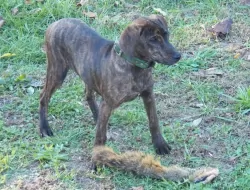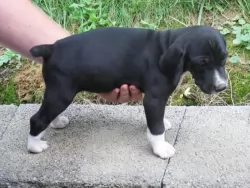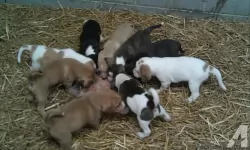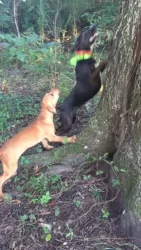 MyDogBreeds
MyDogBreeds Treeing Cur is originated from United States but Anglo-Francais de Petite Venerie is originated from France. Treeing Cur may grow 10 cm / 3 inches shorter than Anglo-Francais de Petite Venerie. Treeing Cur may weigh 7 kg / 16 pounds more than Anglo-Francais de Petite Venerie. Both Treeing Cur and Anglo-Francais de Petite Venerie has almost same life span. Both Treeing Cur and Anglo-Francais de Petite Venerie has same litter size. Both Treeing Cur and Anglo-Francais de Petite Venerie requires Low maintenance.
Treeing Cur is originated from United States but Anglo-Francais de Petite Venerie is originated from France. Treeing Cur may grow 10 cm / 3 inches shorter than Anglo-Francais de Petite Venerie. Treeing Cur may weigh 7 kg / 16 pounds more than Anglo-Francais de Petite Venerie. Both Treeing Cur and Anglo-Francais de Petite Venerie has almost same life span. Both Treeing Cur and Anglo-Francais de Petite Venerie has same litter size. Both Treeing Cur and Anglo-Francais de Petite Venerie requires Low maintenance.
 The Treeing Cur dog is a mixed-breed, working dog which hails from the USA and recognized by the United Kennel Club in November 1998.
The Treeing Cur dog is a mixed-breed, working dog which hails from the USA and recognized by the United Kennel Club in November 1998.
They’ve always been used to tree animals such as squirrels, raccoons, bears, and even mountain lions. They were developed to be used as hunting and guarding dogs.
Aside from these good qualities, today the dog makes an excellent family companion.
 The Anglo-Francais de Petite Venerie is one of the oldest scent hunting dogs around. A crossbreed between the French Hounds and the English hunting dogs, the Anglo-Francais de Petite Venerie is believed to be an offspring of several famous dogs such as the Beagles, the Poitevins, and the Petit Gascon-Sainttongeois.
The Anglo-Francais de Petite Venerie is one of the oldest scent hunting dogs around. A crossbreed between the French Hounds and the English hunting dogs, the Anglo-Francais de Petite Venerie is believed to be an offspring of several famous dogs such as the Beagles, the Poitevins, and the Petit Gascon-Sainttongeois.
Although the genesis of this dog breed is somewhat unclear, a majority of the sources believe that it was developed in the 16th century at a time when written records of dog breeding never existed. Throughout the 16th to the 17th centuries, the Anglo-Francais de Petite Venerie became a treasured dog breed thanks to the rise of hunting games among European nobles. As the sport thrived in England and especially in France, the need to own the Anglo-Francais de Petite Venerie became paramount leading to this dog breed’s popularity. Formerly known as the Petit Anglo-Francais, this dog breed was changed to its current name in 1978 before being admitted to the United Kennel Club in 1996.
 Standing at between 46 – 61cm in height and weighing between 14 – 27kg, the medium-sized Treeing Cur is athletic and muscular.
Standing at between 46 – 61cm in height and weighing between 14 – 27kg, the medium-sized Treeing Cur is athletic and muscular.
He has a short to medium-length double coat that can be in a number of colors. Red and white, tan and white, black and white, brindle, some freckling and bi-colored or tri-colored.
The eyes are mostly brown but can be green or blue too. They’re well-muscled and robust and have medium length floppy ears. The tail is mostly docked but is sometimes left long.
These dogs are alert and intelligent, being easy to train and wanting to please their owners, getting along well with all members of the family, including children and other dogs.
They’re strong-willed dogs and will require training and socialization if you want them to be well behaved wherever they are. He is intelligent so there won’t be any trouble with training him. He is very responsive to what his owner requires of him, with a desire to make their owners pleased with them.
 The Anglo-Francais de Petite Venerie is a dog breed that resembles a Beagle. Developed in France, this scent hound has served as a hunting dog for centuries making it an athletic breed with unusual characteristics. Their chests are narrow and deep while the heads are smaller as compared to the rest of the body. The eyes are brown and dark while the tails are medium in size. The limbs are tall, straight, and muscular while their steady necks and broad muzzles are an indication that these dogs are surely bred for hunting purposes.
The Anglo-Francais de Petite Venerie is a dog breed that resembles a Beagle. Developed in France, this scent hound has served as a hunting dog for centuries making it an athletic breed with unusual characteristics. Their chests are narrow and deep while the heads are smaller as compared to the rest of the body. The eyes are brown and dark while the tails are medium in size. The limbs are tall, straight, and muscular while their steady necks and broad muzzles are an indication that these dogs are surely bred for hunting purposes.
Since Anglo-Francais de Petite Venerie are athletic dogs, you will, of course, expect their overall weight to be lesser as compared to most other breeds. These dogs have a short, dense coat that’s easy to groom. With a life expectancy of about 13 years, these breeds are generally healthy and quite easy to maintain. The only major problem these scent hounds experience is a hip and elbow dysplasia which will require you to inspect them for injuries upon returning home from their line of duty.
 The Treeing Cur is a working dog that loves all the action. He is an alert, intelligent dog, and being territorial and protective, he makes an excellent guardian dog too.
The Treeing Cur is a working dog that loves all the action. He is an alert, intelligent dog, and being territorial and protective, he makes an excellent guardian dog too.
They can show some aggression towards strangers and other dogs they don’t know. Apart from being an excellent hunting dog, the Treeing Cur loves to be around their human family, making loyal and loving companions.
 Anglo-Francais de Petite Venerie are non-aggressive, stubborn but tolerable dogs that work well with kids. However, proper training and socialization must be conducted to ensure that these dogs don’t cause harm to your kids.
Anglo-Francais de Petite Venerie are non-aggressive, stubborn but tolerable dogs that work well with kids. However, proper training and socialization must be conducted to ensure that these dogs don’t cause harm to your kids.
The Anglo-Francais de Petite Venerie is not a shy pet. These dog breeds do make a perfect companion especially due to their hunting characteristics. They can get along well with new owners and should be kept with a same-breed companion to reduce nervousness.
When it comes to their adaptability, Anglo-Francais de Petite Venerie are better suited to be working dogs over being kept indoors. They are therefore suited to farm settings or rural areas where there’s vast track of lands to play and exercise.
Finally, the Anglo-Francais de Petite Venerie is not suited to everyone. This is because this dog breed is quite stubborn and unable to follow orders like most indoor pets do.
 These dogs are very healthy and you’re not likely to have many vet bills when you bring one into your home.
These dogs are very healthy and you’re not likely to have many vet bills when you bring one into your home.
The Treeing Cur has floppy ears, and particularly if it's a dog that loves swimming, it will battle with moisture in the ears. Dogs with floppy ears don’t have good air-flow inside the ears like a dog with erect ears would have. This means that the dog is prone to ear infections.
This is such a common dog illness that can strike even young dogs. That is why it is important to check your dog over regularly for lumps and bumps on the body. Age increases the risk of cancer, so if you feel an unusual lump on your Treeing Cur, better to have your dog checked out at the vet.
 The Anglo-Francais de Petite Venerie is known to be a generally healthy dog with very few health concerns. We think the reason why it’s a healthy dog is due to its athletic characteristic and medium-sized body which is not prone to problems as compared to its large-sized contemporaries. However, since this scent hound is a cross-breed between two well-known breeds, there are chances that it might suffer from several health problems that mostly affect closely related breeds. Some of these health issues include;
The Anglo-Francais de Petite Venerie is known to be a generally healthy dog with very few health concerns. We think the reason why it’s a healthy dog is due to its athletic characteristic and medium-sized body which is not prone to problems as compared to its large-sized contemporaries. However, since this scent hound is a cross-breed between two well-known breeds, there are chances that it might suffer from several health problems that mostly affect closely related breeds. Some of these health issues include;
The hip and elbow dysplasia is a skeletal condition that occurs when the hip or elbow joints fail to develop properly. This condition is very painful and is most common in large breeds such as the St. Bernard, Great Dane, and the German Shepherd. Although the main causes of this condition include; poor nutrition, obesity, lack of exercise, and excessive growth, hereditary issues are very common and can’t be ruled out.
Another health condition you need to watch out for is the demodectic mange. An inflammatory disease caused by various types of mites, the mange can become intolerable in case the number of mites inhabiting your dog’s hair follicles become exorbitant. Among the common signs you’ll expect to see include; redness on the skin, alopecia, and problems with the immune system. To tackle this problem, pet owners will need to groom their dogs more often by digging deep into the skin to identify the mites.
Cataract is a normal eye condition that affects the eye lens causing it to lose its transparency resulting in impaired vision and later blindness. Although this condition is viewed as a byproduct of aging, some dog breeds such as the Anglo-Francais de Petite Venerie are most likely to suffer from this health condition. A common treatment for this condition may include; applying eye drops to help prevent inflammation, surgery or treatment of the underlying factor.
 Being an energetic working dog, this dog isn’t going to be content to be lying around. He is going to need regular exercise. He loves a brisk walk or even a run next to you when you go cycling.
Being an energetic working dog, this dog isn’t going to be content to be lying around. He is going to need regular exercise. He loves a brisk walk or even a run next to you when you go cycling.
When at home, you can consider ball games and hide and seek games with him. They just love to run, and if you live near a park, he will want to be off the leash if possible for some free running and sniffing around.
The short coat of the Treeing Cur will do well with a brush twice a week. While you brush your dog, check him out for ticks and fleas. Also, check him over for any unusual lumps.
Part of his grooming should be to check inside his ears for signs of redness, to make sure his eyes are nice and bright still and to see if he will let you look inside his mouth for bad teeth. Bad teeth can be a source of pain for him.
Caring for your Treeing Cur in a responsible manner means ensuring good food. Such an active dog will require proper nutrients so as to meet his energy and health needs.
Your Treeing Cur will need a high-quality commercially manufactured dog food for active dogs and they will also benefit from other simple cooked foods such as boiled chicken, brown rice and vegetables. The habit of feeding your Treeing Cur human foods such as chocolates, popcorn, peanuts, onions and spices could cause digestive upsets and possible vet fees.
 The Anglo-Francais de Petite Venerie puppies need to be fed with excellent-quality dog food to provide a balanced nutrition for precise growth. For puppies between 8 and 12 months, 4 bowls of food a day will be enough. Puppies ranging from 3 to 6 months old should be given at list 3 meals in 24 hours period. Always feed your puppies with top quality puppy foods to avoid any possible nutritional defects. Dry food mixed with canned food, broth, or water is perfect for puppies.
The Anglo-Francais de Petite Venerie puppies need to be fed with excellent-quality dog food to provide a balanced nutrition for precise growth. For puppies between 8 and 12 months, 4 bowls of food a day will be enough. Puppies ranging from 3 to 6 months old should be given at list 3 meals in 24 hours period. Always feed your puppies with top quality puppy foods to avoid any possible nutritional defects. Dry food mixed with canned food, broth, or water is perfect for puppies.
When your Anglo-Francais de Petite Venerie has reached maturity, it will be best that you feed him once in each day. Always go for the best dog food to ensure that you feed him with proper nutrition. Other meals you can incorporate (but in small quantities) are cooked eggs, fruits, veggies, and cottage cheese.
The Anglo-Francais de Petite Venerie should be fed with excellent-quality food to avoid various health problems such as tooth and bone concerns. Since these breeds are prone to hip dysplasia, regular veterinary check-ups should be observed at all times.
The Anglo-Francais de Petite Venerie is an athletic dog breed that requires regular physical activity to stay in good shape. Following the footsteps of their ancestors, these dogs are hunting dogs despite the fact that some people prefer keeping them indoors as pets. To eliminate boredom, it’s wise that you set aside some time on a daily basis to exercise your dog as well as take a walk down the streets or around the park.